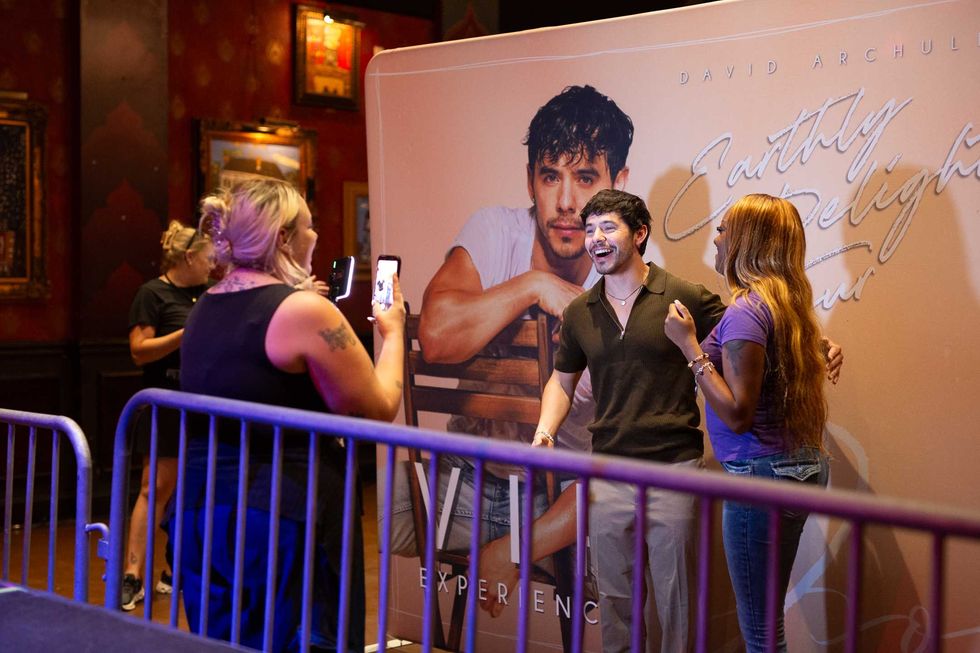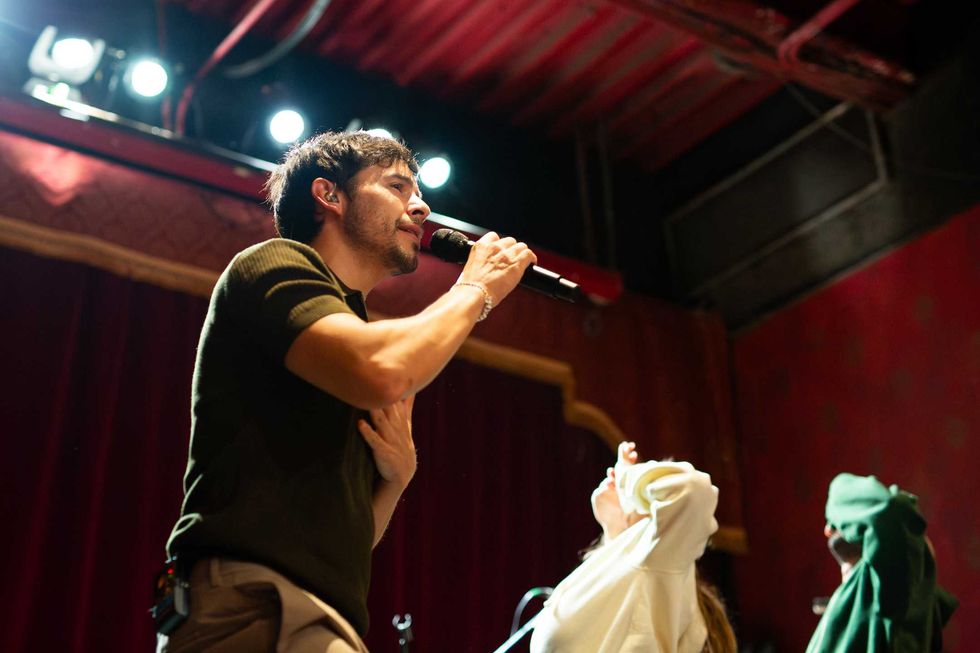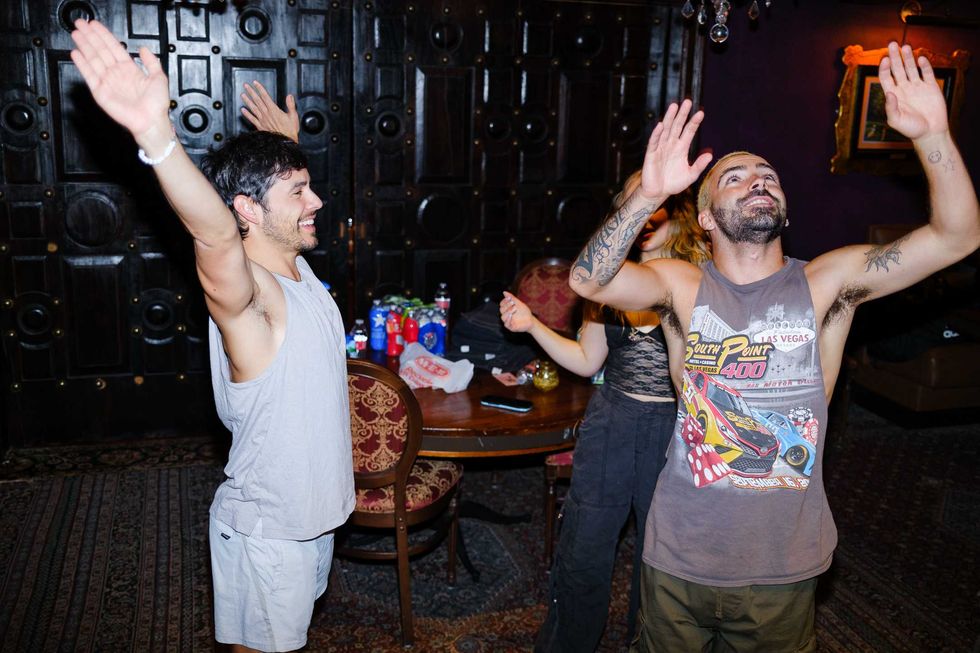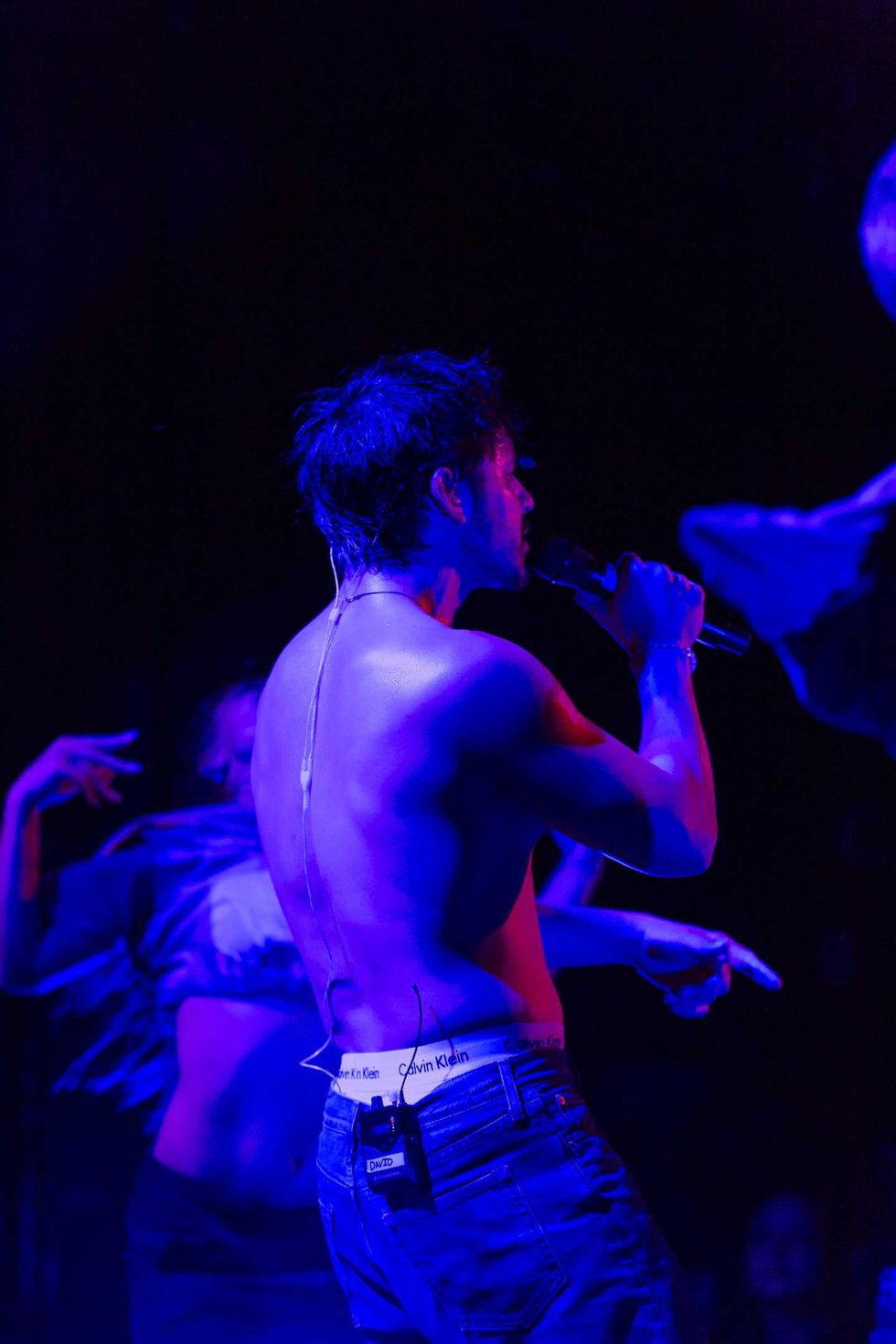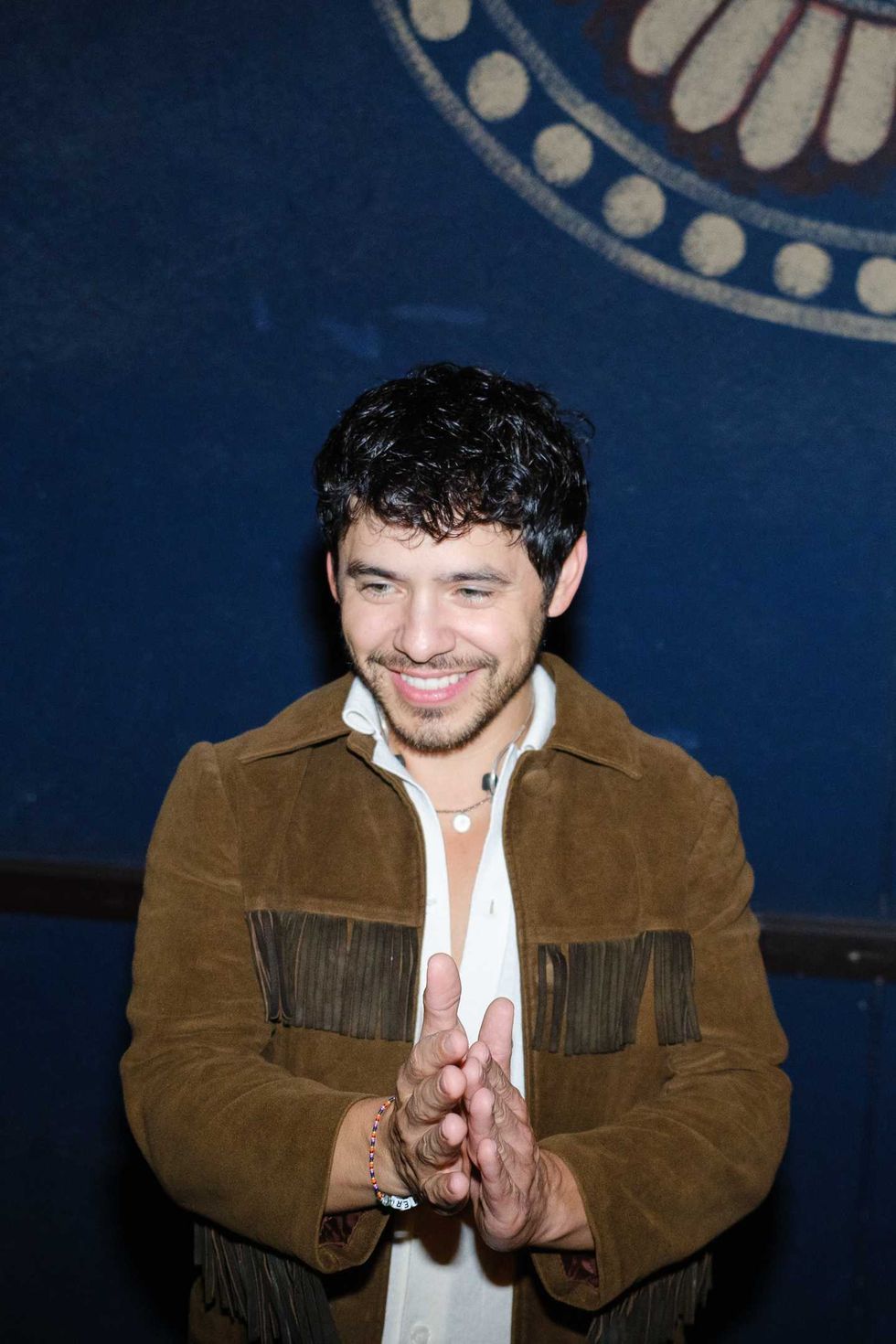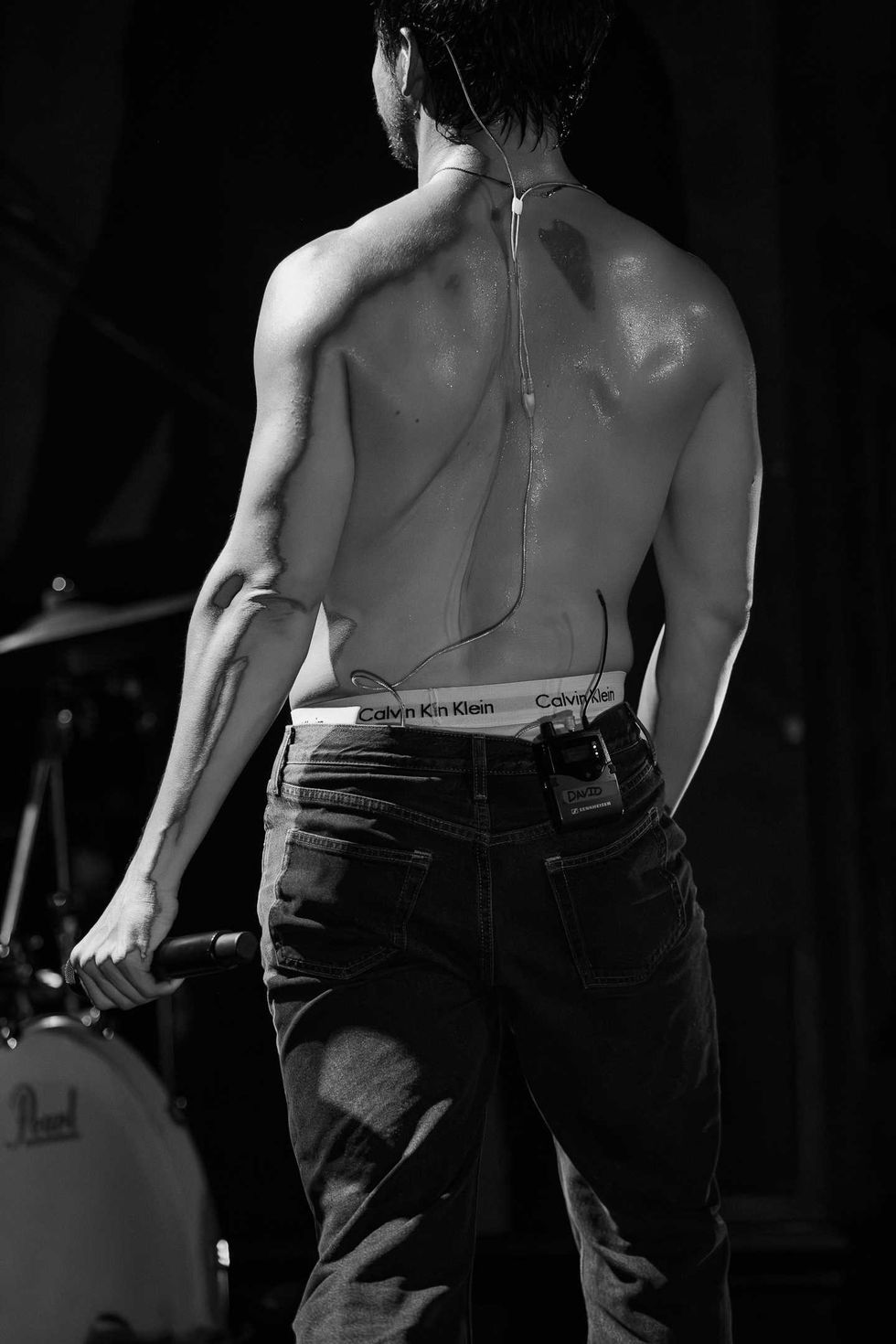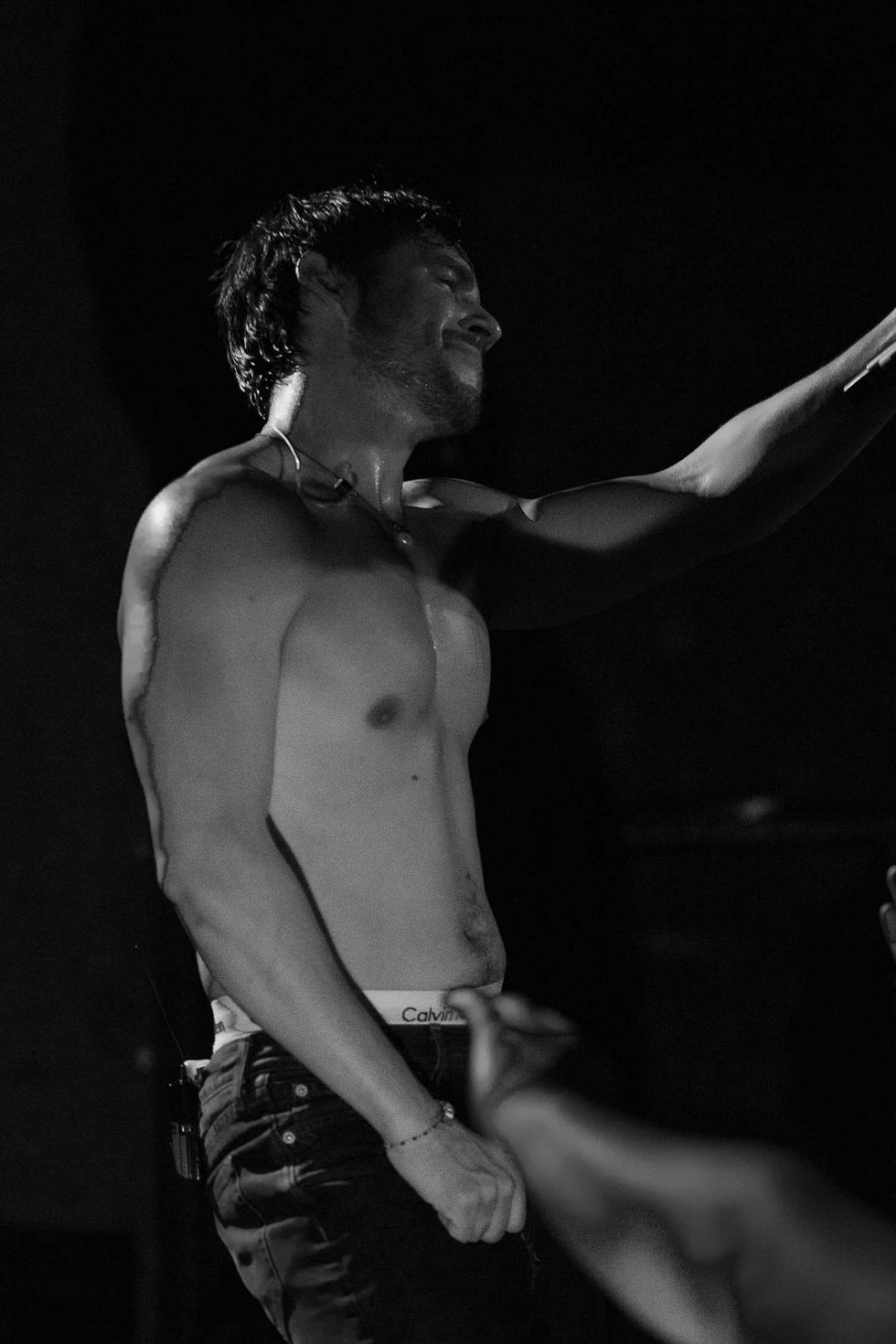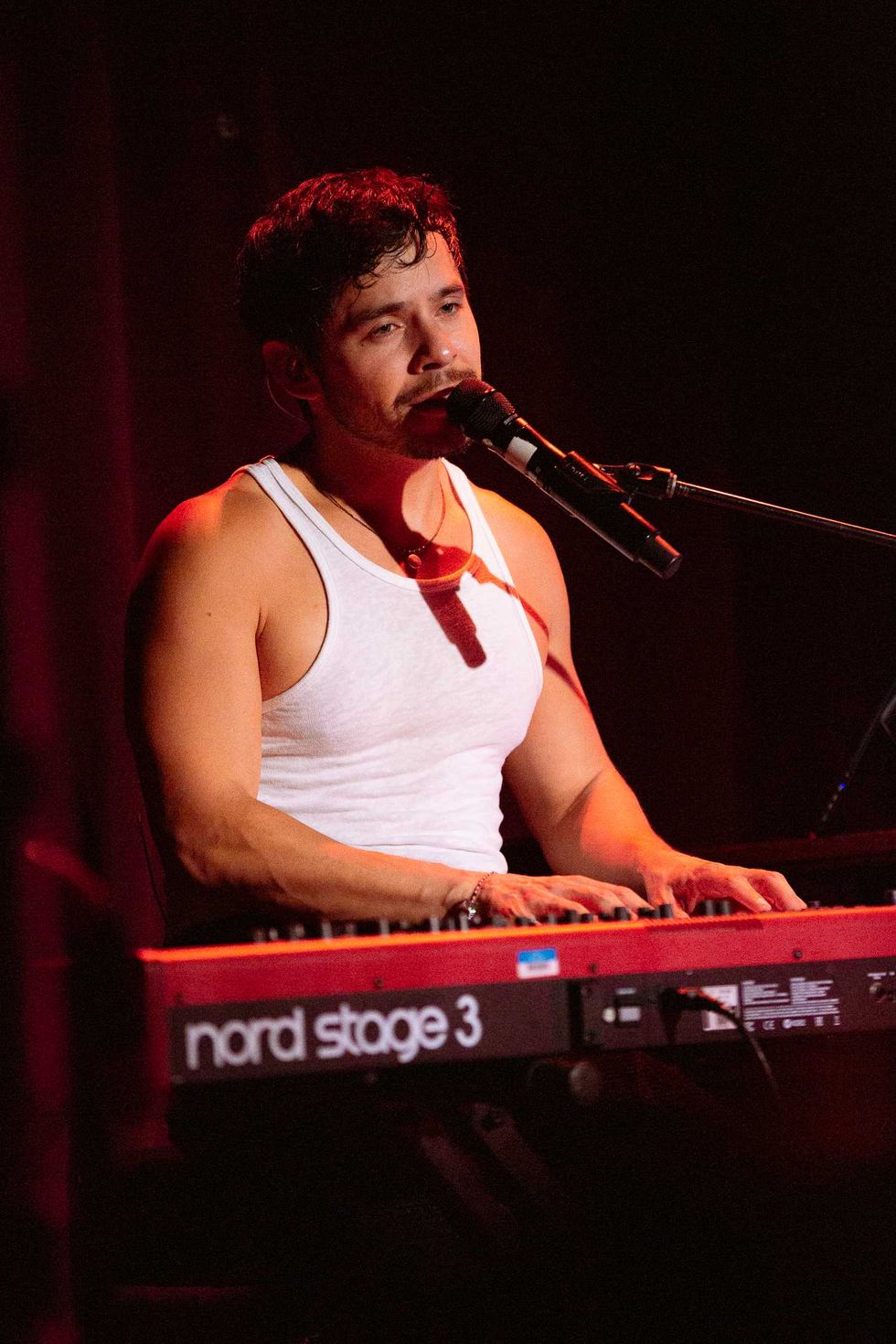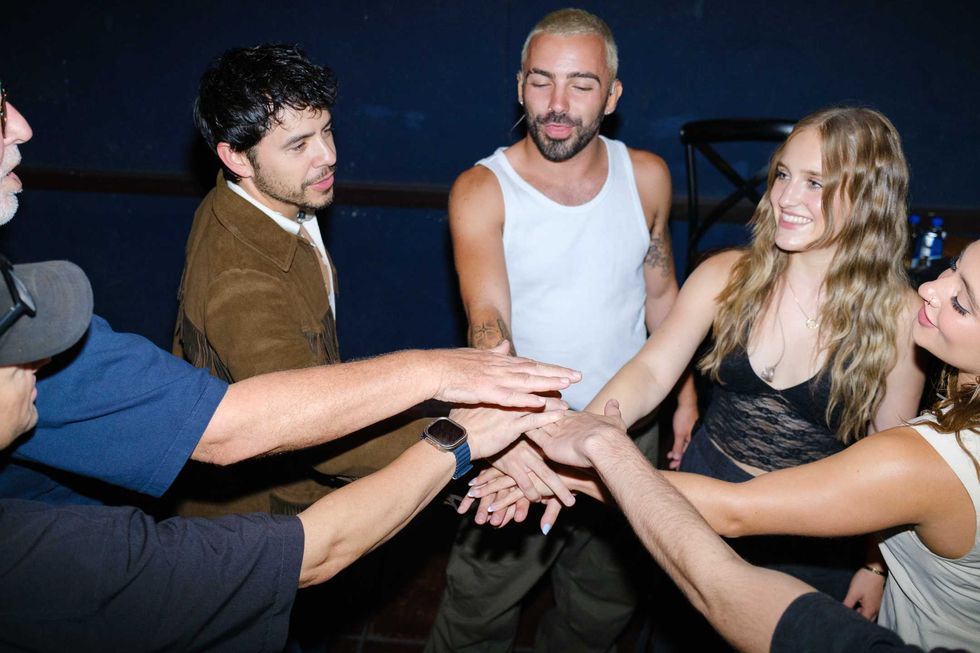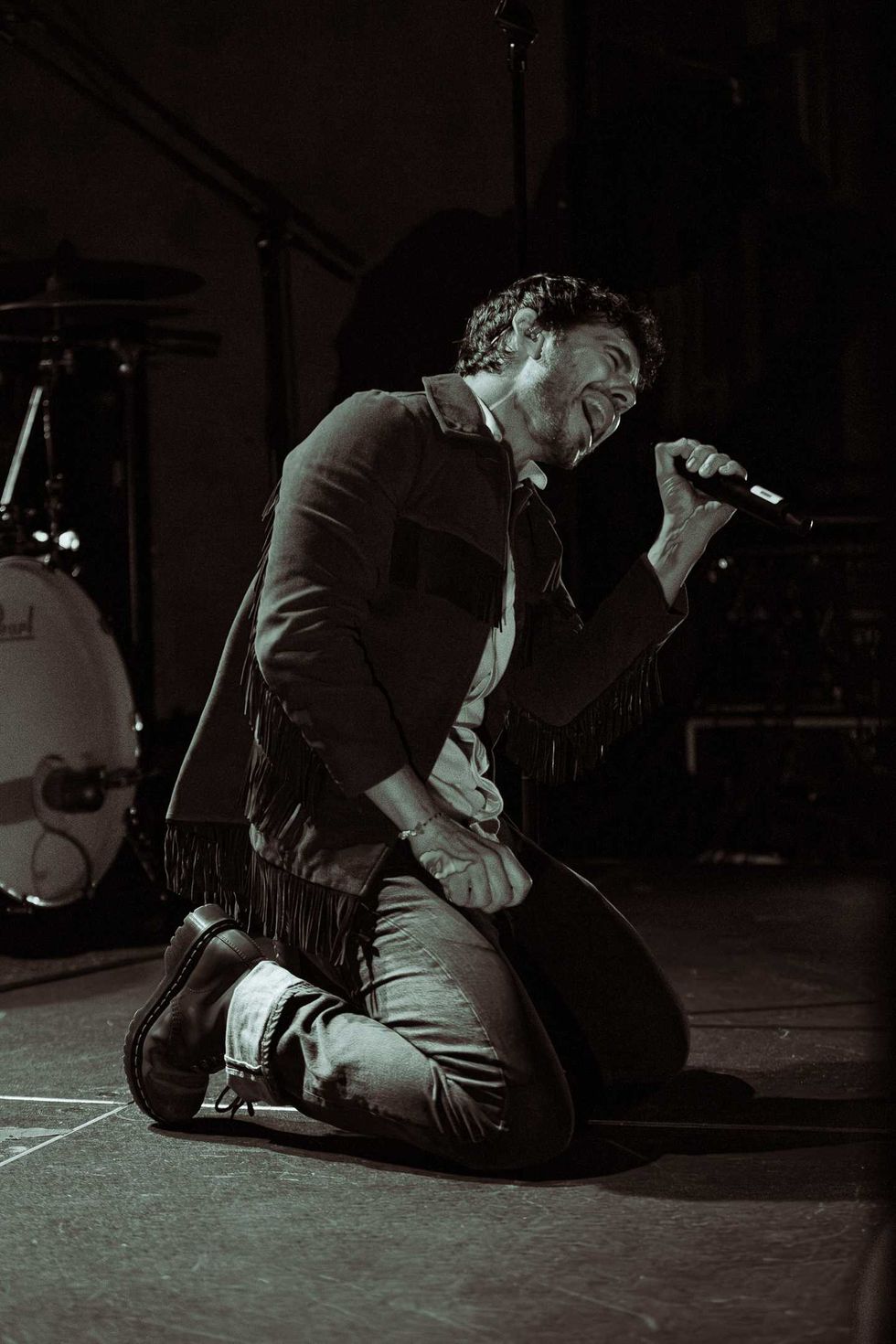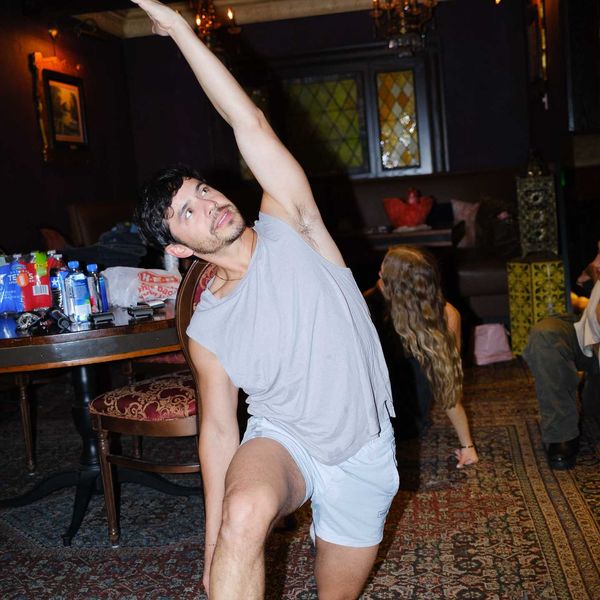
David Archuleta Pulls Back the Curtain on 'Earthly Delights'
By Ivan Guzman
Oct 09, 2025David Archuleta is going deep. Since we last talked to the American Idol alum and recently out ex-Mormon singer, he’s been on a journey of self-discovery and reinvention.
“It’s like putting on a new suit that has to be worn in a little bit,” he tells PAPER. “At first it feels stiff, but the more you move, the more natural it becomes. I was so used to subconsciously hiding myself — my shoulders hunched, not wanting to be touched or touch other people. Now I’m learning to open up.”
Even after coming out in 2021, the 34-year-old was still attempting to carry his religious practice into his work life. “I would start every writing session with a prayer,” he says. “It wasn’t about preaching; it was just for me. I felt like prayer kept me safe, like I needed to protect myself from the world and its temptations.”
But now, he’s indulging in those temptations. His latest EP Earthly Delights — and the national tour that bears its name — marks a literal and spiritual unburdening. Onstage, Archuleta dances shirtless under blue lights, his movements loose and liberated, a visual manifestation of the freedom he’s fought for since leaving the Mormon Church. Backstage, he stretches, laughs with his dancers, and preps for nights that often end with the group heading straight from the venue to a local gay club. “We’ll usually go out and dance after the show,” he says. “That’s kind of become our post-show ritual.”
The transformation feels both symbolic and hard-won. For an artist once defined by his wholesomeness — the soft-spoken teenager who came in second on Idol and sang “Crush” with angelic restraint — this era finds him exploring the messier, more sensual corners of selfhood. The tour’s title nods to Hieronymus Bosch’s infamous triptych, a surreal depiction of heaven, earth, and hell that mirrors Archuleta’s own reconciliation of faith, desire, and freedom.
That duality between the sacred and the sinful, the stage and the church pew, has long followed Archuleta. Even in our conversation backstage in Texas, he spoke about the cultural fallout of leaving Mormonism, recalling how performing in Utah has become “the lowest attendance I’ve ever had there” since stepping away from the faith. But he’s no longer interested in living for approval. “It’s about embracing the things I once thought I had to protect myself from,” he says.
That embrace — sweaty, luminous, and deeply human — is what defines Earthly Delights. Archuleta isn’t preaching anymore. He’s moving, sweating, feeling. And for perhaps the first time in his life, he’s finally free.
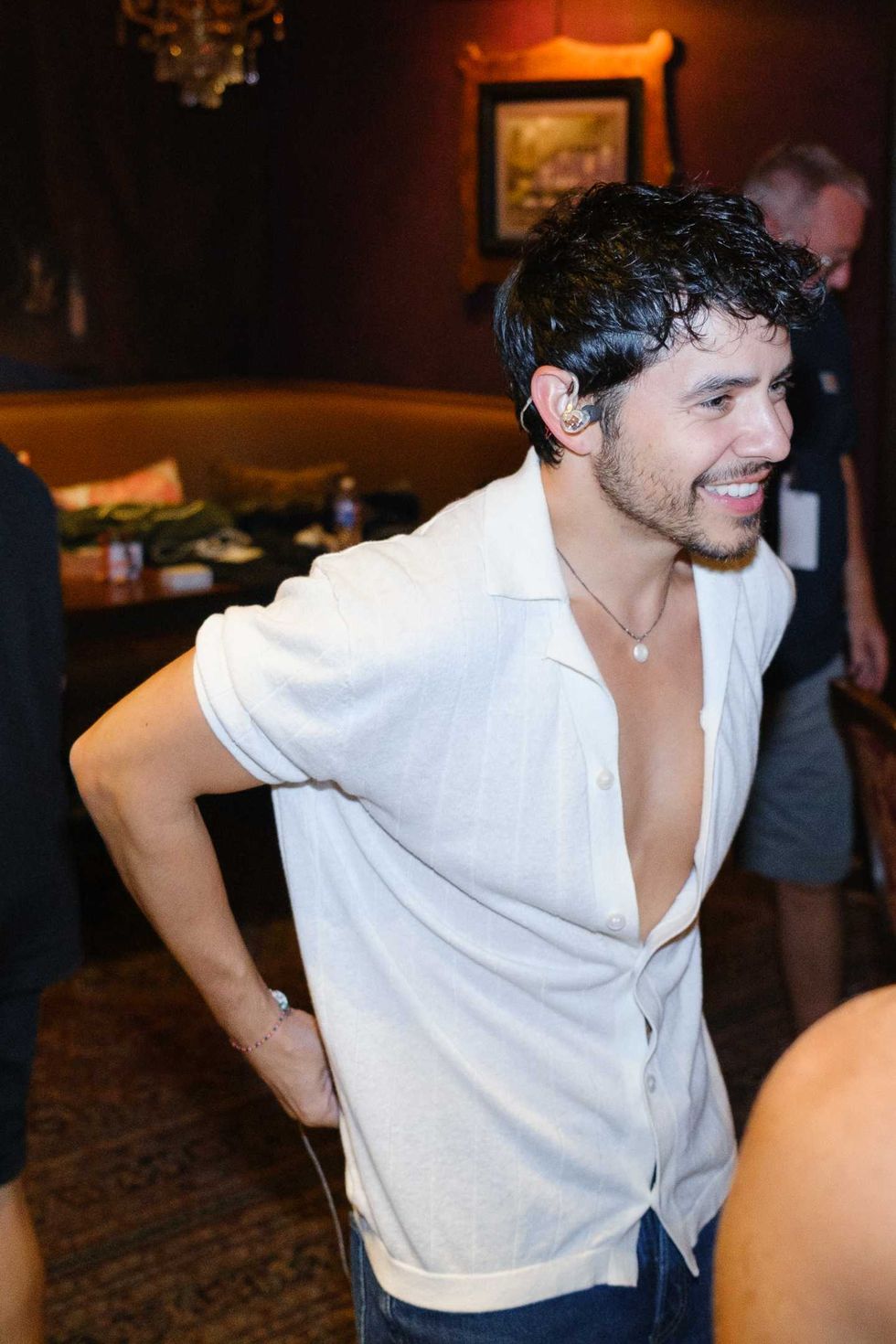
You were saying this is your first tour drinking, and your first tour as a non-Mormon. Has that been a journey for you? What’s your approach to touring now that you’re freer? Do you feel more open on stage?
I’m learning how to get more in touch with my body — to move it, feel it. It’s kind of like putting on a new suit that has to be worn in a little bit. At first, it feels stiff, but the more you move, the more natural it becomes. I was so used to subconsciously hiding myself — my shoulders hunched, not wanting to be touched or touch other people. Now I’m learning to open up, and that really translates on stage. I’ve been trying out choreography, which is new for me.
You’ve never done choreography before?
No, never. This is my first time having dancers on tour, which has been really fun.
Speaking of quite literally being physically restrained, don’t Mormons have those special undergarments? Did you wear them?
Yeah. They’ve changed now — they have tank-top styles — but before that, you couldn’t wear sleeveless shirts or shorts that were too short, because your garments would show.
So they’re like boxers, basically?
Yeah, like boxer briefs that go halfway down your thigh.
When did you stop wearing them? You’ve said you left the church about a year after coming out, so around 2022? Were you still fully practicing — reading scripture and everything — even after coming out in 2021?
Yeah. I came out in 2021 but was still Mormon. There are gay Mormons — people who are actively in the church and out. My friend Charlie Bird is one of them, and he’s breaking new territory being so public about it. I tried to do that too, but… well, I wrote a book about it.
Right, your publicist said not to ask about the book yet.
I know! I always have to stop myself, because I’ll start talking about it and then remember, wait, it’s all in the book.
Do you have any pre-show rituals? Warm-ups or routines before you go on stage?
Yeah, vocal warm-ups, which you saw me doing earlier. And stretching has become really important, because we’re moving and dancing a lot. It’s actually helped me stay healthy; I used to always get sick on tour, but now I’m not. Stretching, getting massages when I need them, and just having fun. After shows, we’ll usually go out dancing. That’s become our post-show ritual.
I feel like dancing has become your church now. Since leaving the church, you’ve found a different kind of community through nightlife and festivals.
Yeah, I think so. One of my songwriter friends, Isabelle, who I worked with on Postcards in the Sky back in 2017, used to talk about that. I was really religious when I made that album. I had songs like “Numb” and “Invincible,” and I would start every writing session with a prayer. I’d always ask, “Hey, are you religious? Is it okay if I say a prayer before we start?” Everyone was cool with it. Even when I wrote in London or LA, I still prayed before writing. It wasn’t about preaching; it was just for me. I felt like prayer kept me safe, like I needed to protect myself from the world and its temptations.
The temptations — the earthly delights.
Exactly. That’s why this tour feels so full circle. It’s the complete opposite of what I used to believe. Now it’s about embracing the things I once thought I had to protect myself from.
I was just listening to “Zero Gravity.” It’s so good. That should’ve been a single.
Oh my gosh, thank you. It was too late to put it on the album, so it ended up just being a standalone song. My dad actually really pushed for that one — he wanted me to release more of the songs I’d written myself. I co-wrote “Zero Gravity,” but the label didn’t want my songs on the record. I don’t know if it was a control thing, but there was definitely tension. Everyone had strong opinions, especially my dad.
Right, there’s some tea there. I’m sure a lot of that’s in the book.
You’re right. [Laughs] It’s very much in the book. Looking back, I guess he really was a stage dad.
You’ve mentioned that before, though. It must’ve had its challenges, but also benefits.
Yeah, totally. I mean, I was a minor, so by law he had to be there. I think if he hadn’t been, I probably would’ve been run down a lot more. Maybe I would’ve had more opportunities, but also more burnout. So it is what it is.
You were so young. I was watching your meet-and-greet earlier, and people were coming up saying, “Do you remember me?” You’ve been meeting fans since you were 17. I was like, "He can’t possibly remember everyone!"
[Laughs] No, not everyone. But I think you’re talking about Tara. She was wearing a 2009 David Archuleta shirt. She told me she’s been a fan since she was four, and now she’s a grown adult. It’s wild. It makes me realize how old I am compared to other adults now.
What’s your relationship like with your fans now? I remember being eleven and deep in those early fan forums — FanBlast, Fans of David, all of it. But a lot of the fandom back then was older women, and I feel like many of them still come to your shows.
Yeah! Like Houston Gwen. She DMed me saying she’s coming to my Franklin show, but she can’t do standing-room anymore [Laughs]. She’s too old for that now. Then there were Nancy and Deb from Canada. They called themselves Snow Angels. My dad was obsessed with that fanbase. I think because he was so involved in it, my way of rebelling was to distance myself from it. It was weird — I wanted to connect with my fans, but he already had those relationships. He’d hang out with them, talk to them, even bring some of my biggest fans over to our house. I’d be like, Why are there strangers in our home? It made it hard for me to feel like they were my fans, because he was always in the middle. Eventually, I had to send him home from tour, even though he was technically my manager. But now, I’m in charge of my own life — no American Idol machinery, no stage parents. I get to talk to my fans directly and set boundaries in a way I couldn’t before.
That must’ve been hard, especially being so young on Idol.
Yeah, my family didn’t really understand what I was going through. My dad thought he did, but he was more of a spectator. He thought he was part of the show. I don’t think he grasped how heavy it all was mentally, being 17 on the biggest show in the world. People like Jordin Sparks totally get it. I’m sure Miley, Bieber, Selena — all those Disney kids do too. When you’re that young and millions of people suddenly know who you are, it messes with your sense of self.
Do you ever think about how things might’ve gone if you hadn’t gone on your mission? If you’d kept the momentum going?
I think about it sometimes, but honestly, my mission saved me. Even if I’d stayed, I was already on track to self-sabotage. I wasn’t happy — mostly because of my dad. I couldn’t enjoy anything, even the success. That was fifteen years ago now. We haven’t worked together in over a decade and we’ve been able to mend things. I even invited him to my Salt Lake show recently. But at the time, it was exhausting. You’re performing, writing, doing press, and then on top of that, you have your dad micromanaging you. It’s like the Whitney Houston story, or Britney Spears — when a parent blurs the line between family and business. You try to say, “Hey, I disagree,” and they take it personally, like you’re being disrespectful. They tell you they’re protecting you from people trying to take advantage, but sometimes, they become that person themselves. I think part of me wanted to burn everything down just to prove I didn’t need him. I remember thinking, I’d rather lose my whole career than lose my freedom. So yeah, going on my mission was kind of my rebellion.
You went on your mission to get away.
Exactly. And it was during that mission that I finally started to come to terms with my sexuality.
That’s interesting. It’s the opposite of what you’d expect. Most people go on a mission to get closer to God, but you went and ended up discovering yourself and your sexuality.
Yeah. Before my mission, I never really had time to think about myself. A lot of that came from the dynamic with my dad. He didn’t want me thinking for myself, which is why he was actually upset that I was going.
He didn’t want you to go on your mission?
No, he didn’t. Which is ironic, right? He was Mormon, but it was really my mom who became deeply involved later on. Around the time I left for my mission, my family started leaning in hard. Suddenly, we were the “example” family. In Utah, it became this narrative: David Archuleta gives up fame to serve God. That came with a lot of pressure — our name had become this symbol of spiritual status. In that culture, the more devout you are, the higher your social standing. So stepping away from that has been fascinating. Doing my Salt Lake show recently was the lowest attendance I’ve ever had there. And I think it’s because, in the Mormon community, once you’ve “tasted the sweetness” and then leave, you’re seen as worse than someone who never joined. When my dad left the church years ago, I saw him as a traitor. Now I understand that’s how some people in Utah probably view me. It’s complicated.
You’re doing another Christmas tour. Has your approach to Christmas stuff changed since leaving the church? A lot of Christmas music is religious.
Totally. My first Christmas album was really spiritual — my dad was the driving force behind that. He wanted it to be a way to honor God, even though my label wanted me to stick with pop. That record was his baby. But the new Christmas EP is different — it’s lighter, more playful. I just don’t want to take life so seriously anymore. I did that for decades.
You probably felt older at seventeen than you do now.
Exactly. I’ve lightened up so much. Back then, most of my friends were older, which probably explains why my fanbase skewed older too. Those were the people I related to. They took life seriously, like I did.
And then you had the younger girls who had crushes on you — even sexualized you — while you were closeted and Mormon, which must’ve been a weird, layered experience.
Yeah, it was a lot to navigate [Laughs]. I didn’t really know how to engage with that energy. But I’m in such a different place now.
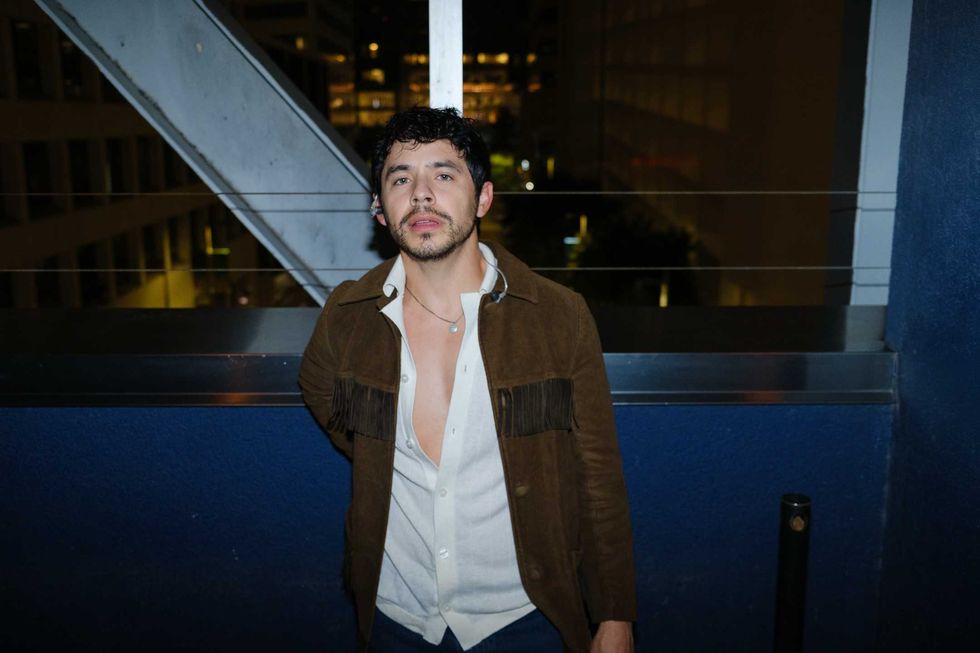
Photos by Emil Jraissati
From Your Site Articles
Related Articles Around the Web
MORE ON PAPER
ATF Story
Madison Beer, Her Way
Photography by Davis Bates / Story by Alaska Riley
Photography by Davis Bates / Story by Alaska Riley
16 January
Entertainment
Cynthia Erivo in Full Bloom
Photography by David LaChapelle / Story by Joan Summers / Styling by Jason Bolden / Makeup by Joanna Simkim / Nails by Shea Osei
Photography by David LaChapelle / Story by Joan Summers / Styling by Jason Bolden / Makeup by Joanna Simkim / Nails by Shea Osei
01 December
Entertainment
Rami Malek Is Certifiably Unserious
Story by Joan Summers / Photography by Adam Powell
Story by Joan Summers / Photography by Adam Powell
14 November
Music
Janelle Monáe, HalloQueen
Story by Ivan Guzman / Photography by Pol Kurucz/ Styling by Alexandra Mandelkorn/ Hair by Nikki Nelms/ Makeup by Sasha Glasser/ Nails by Juan Alvear/ Set design by Krystall Schott
Story by Ivan Guzman / Photography by Pol Kurucz/ Styling by Alexandra Mandelkorn/ Hair by Nikki Nelms/ Makeup by Sasha Glasser/ Nails by Juan Alvear/ Set design by Krystall Schott
27 October
Music
You Don’t Move Cardi B
Story by Erica Campbell / Photography by Jora Frantzis / Styling by Kollin Carter/ Hair by Tokyo Stylez/ Makeup by Erika LaPearl/ Nails by Coca Nguyen/ Set design by Allegra Peyton
Story by Erica Campbell / Photography by Jora Frantzis / Styling by Kollin Carter/ Hair by Tokyo Stylez/ Makeup by Erika LaPearl/ Nails by Coca Nguyen/ Set design by Allegra Peyton
14 October
